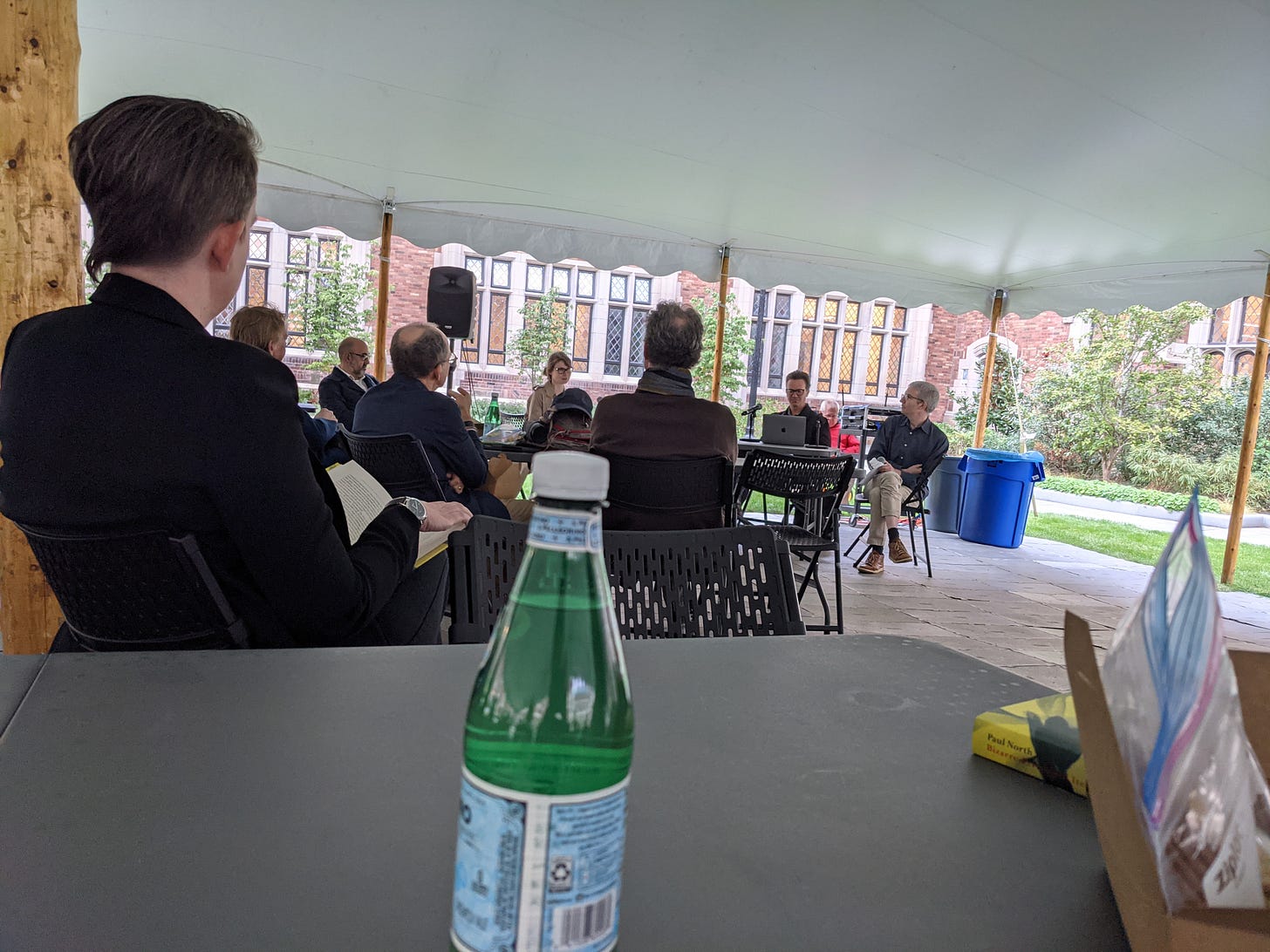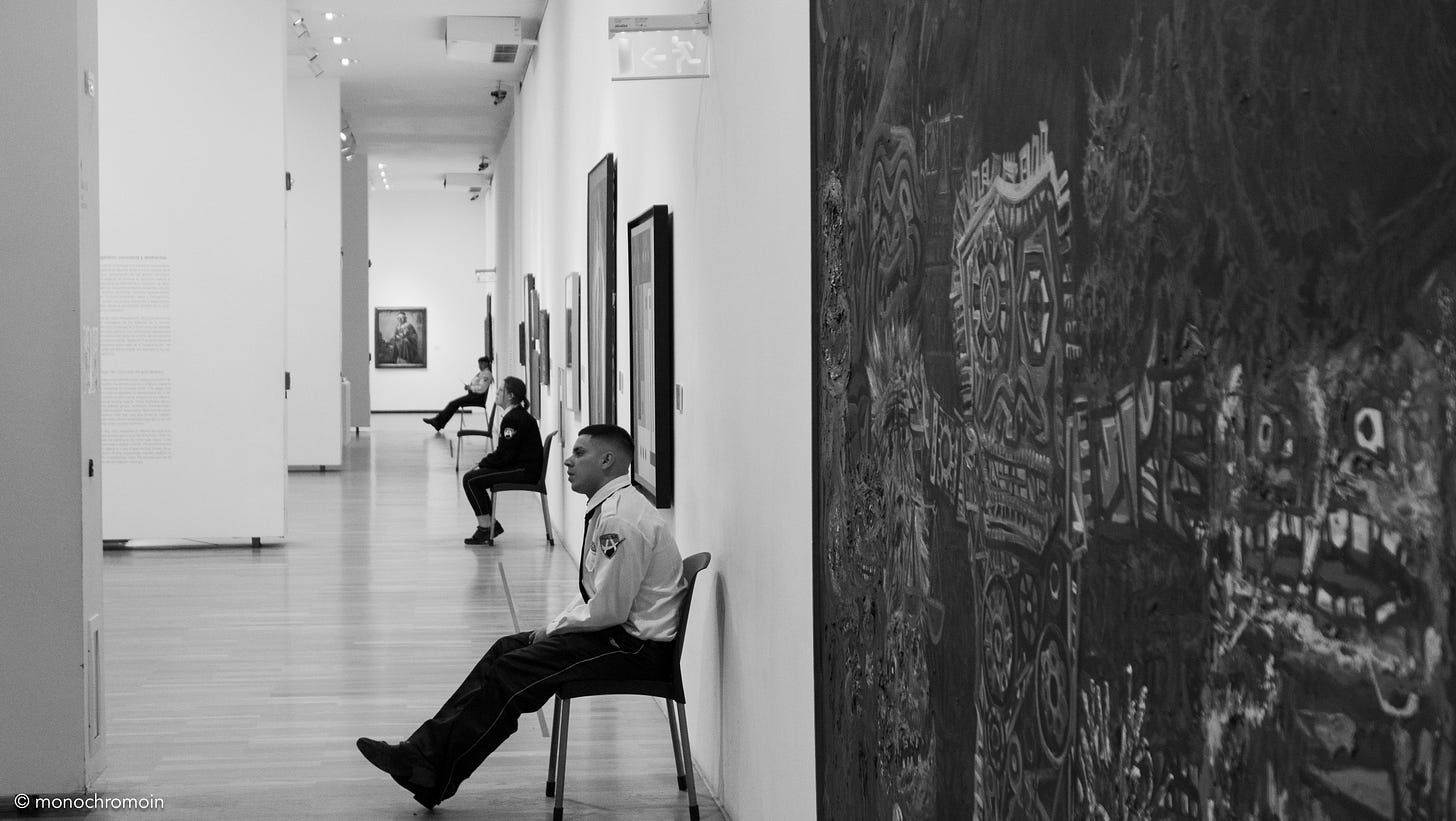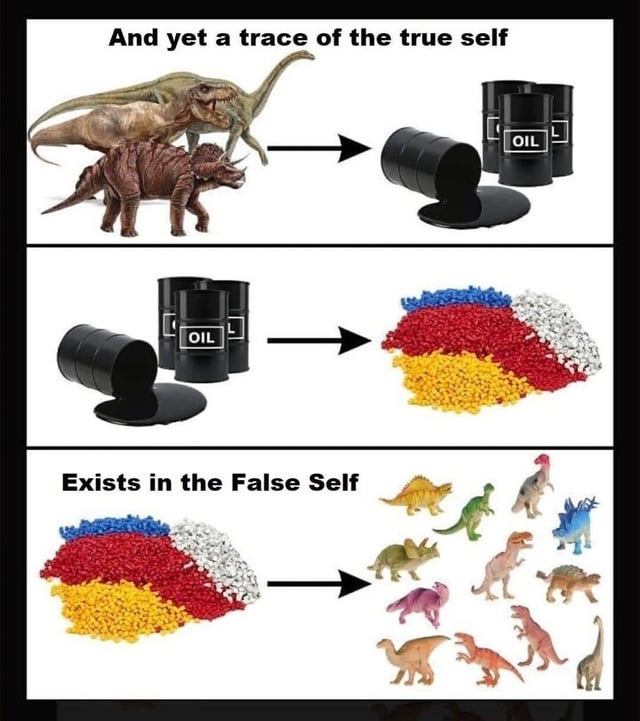Pancakes, Waffles, and the Logic of Likeness (Ch. 19)
Dearest readers, old and new,
Yes, I’ve been away—apologies! I’d initially penned a post-worth of apologia for my absence, but then I decided to just skip the plaintive, pretentious prologues. For the record, the discarded draft was dramatically pompous, even by our standards, spiraling into existential queries like "all writing is delusion" and "why write anything at all if it is all destined to be relegated to the depths of literary mediocrity?" In short, less whining, fewer excuses. Rest assured, there are some long-term projects simmering on the back burner, which I hope to share with you all soon.
This edition is a doozy! We start with a seemingly benign debate: Pancakes or Waffles? What begins as a road-trip game about culinary choices quickly evolves (or devolves, depending on your persuasion) into musings (or ramblings) on metaphysics. Along the way, we ask what it means to be 'fluent,' 'Indian,' 'human,' and then what it means to be 'like' something?
Before we proceed, I thank you for your readership and patience. Should you wish to receive these irregular articles at irregular deadlines in your (allegedly) irregular inboxes, please do subscribe. It’s free, as all good things are!
Pancakes or Waffles?
Two years ago, on a road-trip through the verdant vistas of North Carolina, my dear friend Jai introduced me to a whimsical yet unexpectedly profound game: Pancakes or Waffles. Here’s a quick overview: The game begins with one player—the 'den'—who thinks of a word, be it as mundane as 'pencil' or as abstract as 'freedom'. The den does not reveal their chosen word but is first asked by the guessers, "Is it closer to a pancake or a waffle?" The criteria for the decision, whether visual, physical, linguistic, or a mysterious 'pancakeness' or 'waffleness', is left entirely to the den's discretion, introducing a delightful subjectivity to the proceedings.
From there, the game spirals into increasingly curious comparisons: is it closer to a waffle or a sandwich? From pancake or waffles, the comparisons could leap to incarceration or teddy bears in a few playful bounds. The game, which surprisingly tends to be finite, reveals not only the guessing strategy but also a curious insight into our perception of categories and similarities.
Reflecting on this game led me to ponder the Platonic ideal—what does it mean for something to inherently lean towards the essence of a pancake or a waffle? Plato, were he a guest at our breakfast table, might suggest that these items partake in their respective forms: immutable, perfect templates residing in the ethereal realm of forms. Here, the essence of "pancakeness" or "waffleness" dwells, untouched by the vicissitudes of worldly pancakes and waffles (is man not a featherless biped, or is man a pancake?). Each object or concept participates in a form—unchanging essences like 'treeness' or 'oneness'. These forms, he posited, are the true reality, existing in a different world—the world of forms, which our material world merely imitates. Aristotle, Plato’s pragmatic pupil, might counter that while forms are instructive, it’s the characteristics—taste, texture, shape—that define these breakfast staples in the tangible world. A pancake, flat and fluffy, absorbs syrup into its very being, while a waffle, with its grid-like façade, holds its toppings in each geometric pocket.
A Rorschach Test of Everyday Objects
Why, then, does 'radiator' evoke waffleness, while 'cushion' suggests pancakeness? Is it the structured heat of the former, akin to the crisp lines of a waffle, or the soft, yielding nature of the latter, reminiscent of a pancake’s embrace? This reflection is not merely culinary frivolity but a serious inquiry into ‘thisness' or haecceity, as the philosophers would call it, that peculiar property that makes an object uniquely itself. What is a waffle? Is it its taste, its shape, its texture? And if something possesses all these qualities, must it not be a pancake, according to our sensory and conceptual recognition? Or some of these qualities, and if so how many? By extension, what properties make something NOT a pancake? Is a square ‘pancake’ a pancake? A frozen ‘pancake’ a pancake? A stone ‘pancake’ a pancake? Is a small beige dog a pancake? Am I a pancake?
This ontological breakfast buffet inevitably leads us to the Duck Test: if it looks like a duck, swims like a duck, and quacks like a duck, then it probably is a duck. But is it always so straightforward? Can something look like a duck, yet be a bird of a different feather altogether?
This theme of deceptive appearances is humorously captured in the British comedy "Peep Show"(highly recommended for fans of British humour), where Jez, debating the validity of a life coaching certification, sardonically notes, “If it looks like a life coach, and has a certificate saying it's a life coach, then it's probably a life coach!
To further complicate matters, we encounter real-world 'quacks'—those who resemble the genuine but are devoid of substance. They quack, but does that make them ducks? The theme of pretenders, fakes, and, grifters has been a common one throughout Ink-uilab chapters (An index of Ink-uilab topics can be found here). A recent update on the saga is a Guardian article exposing Jay Shetty, the so-called 'social media monk,' whose spiritual veneer fooled the media and political establishment.
An alternative conception to the duck test would be David Hume's Bundle Theory, which strips an object to a mere collection of its properties—there is no 'core' object beyond this bundle. An apple is nothing more than its redness, its roundness, and its fruitness, with no underlying substrate. This notion provokes a deeper investigation into the essence of identity itself. Can we apply this theory to the Ship of Theseus? I discuss the Ship of Theseus, in the context of cinema, in Chapter 12. This thought experiment, explored in various cultural narratives including a favored Indian indie film and the saga of "Lajos Kossuth's (see below) pocket knife" in Hungarian lore, asks if an object that has all its components replaced remains fundamentally the same object. If I were to take my economics dissertation, break it up into arguments, and reconstitute it into another paper, would that make it a ship of thesis?
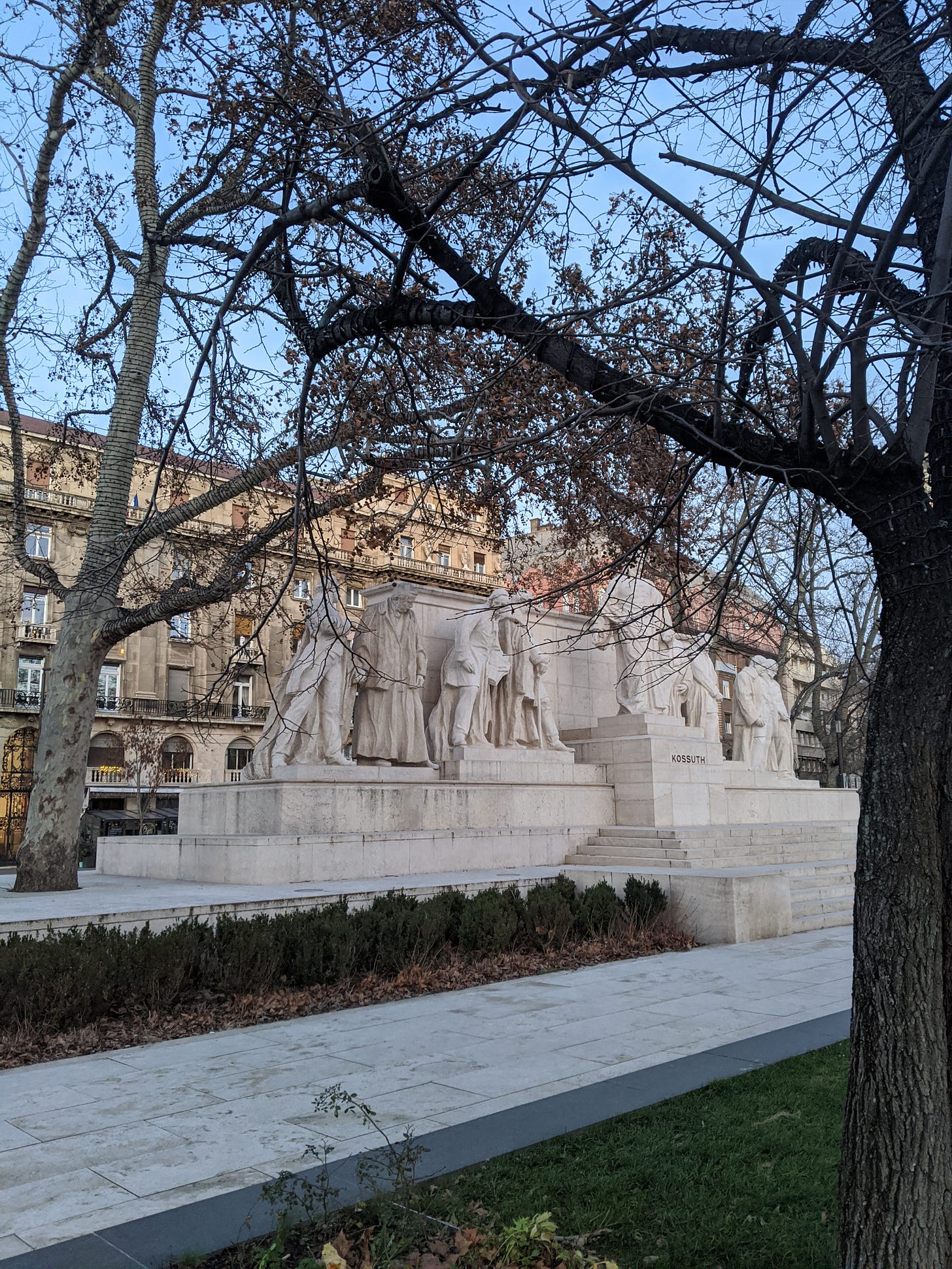
As we ponder whether a ship, meticulously reconstructed plank by plank, remains the true Ship of Theseus, we are compelled to ask similarly profound questions about human identity and essence, inspired by Mikhail Bulgakov’s darkly comedic ‘Heart of a Dog’ (1925). Here, the transformation of Sharik, a stray dog into a human, after receiving human glands, becomes a satirical exploration of Bolshevik social and cultural eugenics, highlighting the absurdity of defining identity through mere physical or social constructs. Sharik, surgically morphing from a mistreated mongrel into Polygraph Polygraphovich Sharikov, who both thwarts and perpetuates societal corruption, embodies the question: does changing parts of one's physical or social identity fundamentally alter one's true self? Is Sharik still a dog if he walks, talks, and misbehaves as a man? Or has he become something new, a reflection of the human condition veiled in canine origins? I gush about Bulgakov regularly, and the book (and 1988 movie adaption) are stellar and certainly worth reading.
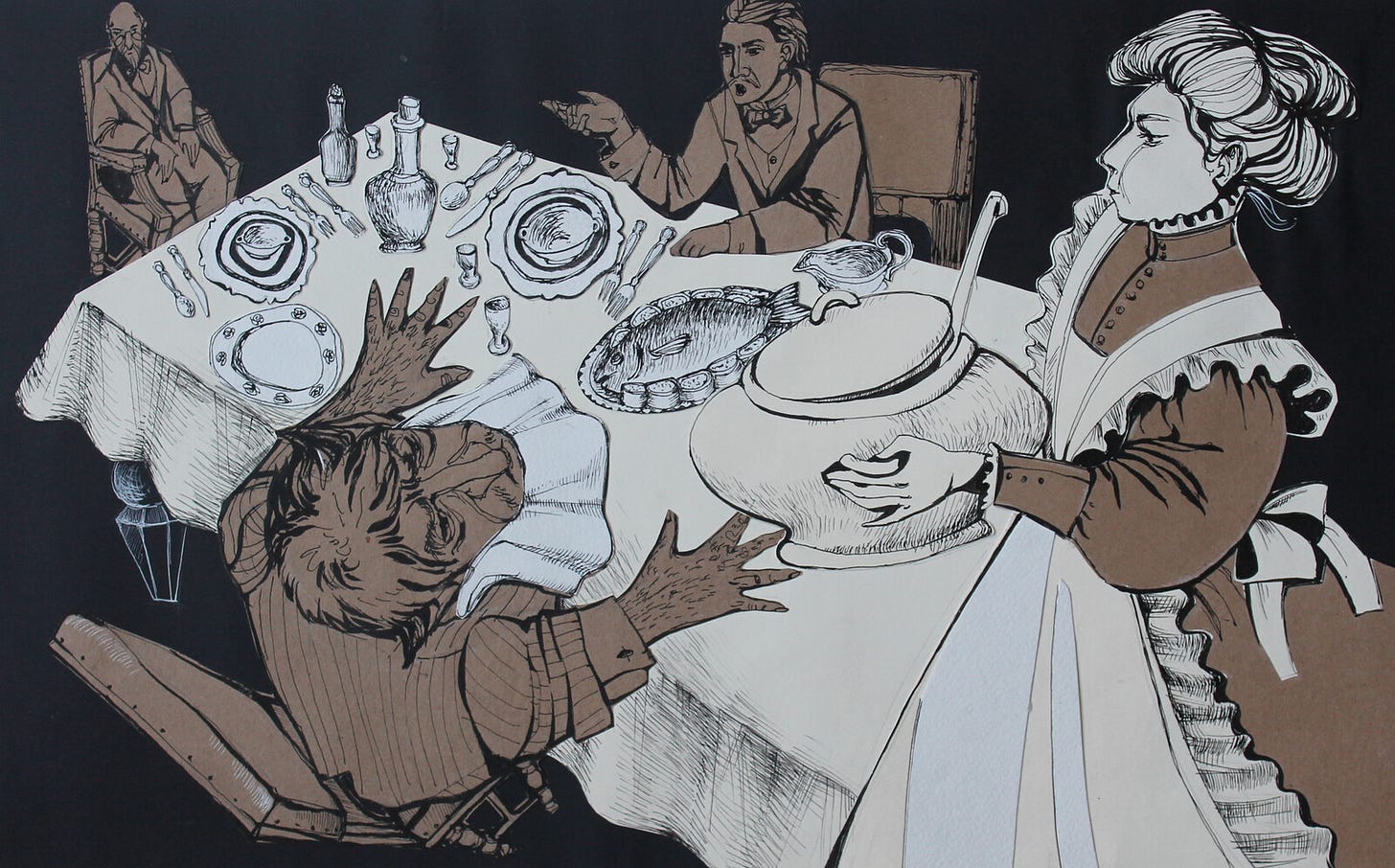
Similarly, in Stanisław Lem’s Przekładaniec (1955), the identity crisis deepens when Richard Fox, after a series of transplants involving his brother's body parts, becomes entangled in legal and ethical dilemmas. The film, a tragicomedy rooted in transplantology, challenges the viewer to consider whether Richard, transformed through the physicality of his brother Tom, is still Richard, or if he becomes another entity altogether.
Can translating someone geographically inherently change who they are? Does migration make you a different person? This lovely short story by the witty Kiran Sampath titled The Attaché’s Wife, appeared in Granta, and explored what it means to be Indian. The protagonist, despite his deep roots and unchanged accent, is perceived as an outsider in his own homeland simply because of his prolonged absence abroad. His struggle with being perceived as foreign in familiar lands mirrors the philosophical quandaries posed by Bulgakov and Lem, questioning whether physical presence, or lack thereof, can dilute or redefine our essence. As the attaché navigates different cultural landscapes, he faces the recurring question—“But you should explain the background to him, after all he’s not from here”. Given that the story is relatively short, and behind a paywall, here it is, in its entirety:
Everywhere J traveled in the country with the government press attaché, people would turn to the attaché and say, ‘But you should explain the background to him, after all he’s not from here.’
One day, exasperated, J said to the attaché, ‘Will you tell me why people keep acting this way with me? Do they sense something about how I walk? My clothes? My accent hasn’t changed at all since I left.’
The attaché smiled. ‘But they know you live abroad.’
J, an internationally syndicated columnist, had been invited by the government to write a report about the country’s progress.
‘But does that mean,’ J said, ‘does that mean I’ve lost my connection to the country, that I’m not capable of understanding it? After all, I’m from here. I grew up here. In fact, that’s why the government invited me back for this work.’
The attaché said, ‘That’s a good point,’ though he clearly didn’t believe that.
J couldn’t let it go. ‘Millions of our people live abroad. Is this how you want them to feel?’
‘But there are certain things, sir, only a local –’ The attaché held his tongue.
‘But that’s what I’m saying. What is this magical thing I don’t understand? OK, fine: I’m not aware of the name of the latest cricketer or whatever sidey politician is in charge of this district. But why is that even important? This obsession with proper nouns – that’s not wisdom. As far as I can tell, the basics of the place – the corruption, the pettiness – have not changed.’
‘It seems like you have decided on the content of your report, sir,’ the attaché mused.
‘This habit of putting people in categories. Inside, outside; upstairs, downstairs. And as far as you’re concerned, I’m outside. How could I – some foreigner with zero connection to this place – possibly understand anything about this great country? Why even invite me to make a report?’
‘No, sir, it’s so you can understand,’ the attaché said.
J was beginning to comprehend the attaché’s humor. ‘You think this, all this that I’m saying, it’s proof of being a foreigner,’ J said, ‘getting bent out of shape like this –’
‘Not in the slightest, sir,’ the attaché said, but J could swear he saw his eyes twinkling.
‘OK, let’s continue on our tour,’ J said.
But as they drove around the city, J got angrier. He remembered now why he’d left in the first place: the people of this poor hot country were smug when they had nothing to be smug about. They were petty and possessive.
I’ll write the damn report, he thought. And it’ll be damn negative.
In the middle of the night, when the attaché was asleep, he received a call.
‘I knew it!’ the voice on the other end was shouting. ‘I knew it! They don’t say this to foreign journalists, only to people like me who left!’
After getting his bearings, the attaché said sleepily, ‘Perhaps they feel you’ve outgrown our little country, sir.’
‘No, no, no, not at all! They’re angry. Angry that I got away from this place. They want to pull me down!’
‘The visit is arousing feelings for you, sir,’ the attaché said.
‘All you bloody people are!’
Then the phone was slammed down.
‘Who was that?’ the attaché’s wife asked.
‘Some foreign journalist.’
‘Oh,’ she said.
‘But he grew up here,’ the attaché said.
‘Ooof,’ she said.
‘And he’s angry people don’t treat him like he’s from here.’
‘He might be the first person I’ve heard of who wants to be from here,’ she said.
They both snickered.
‘Goodnight,’ he said.
‘Goodnight,’ she said.
Then, suddenly, the attaché got up. ‘Is that really what you think of our country?’
These metaphysical musings extend beyond pancakes and psychological thrillers. Consider fluency in language, as my friend Sachien presented in his magnificent thesis on Linguistics and Computing. His research raises fundamental questions: What does it mean to be fluent? Is it a bundle of measurable skills, or is it more nebulous, perhaps a feeling of comfort in communication? Is fluency the ability to seamlessly construct sentences, or does it involve deeper cultural and contextual understandings that align with the native speakers' perceptions? Moreover, what does it mean to be alike? Are some languages more 'like' English than others, and what implications does that hold for learners and linguists? Does proficiency in certain languages predispose one to perceived fluency in others, based on structural or phonetic similarities?
The Logic of Likeness
At this point in our philosophical breakfast, we find ourselves with a smorgasbord of questions with no definitive answers in sight. Why is something more akin to a pancake than a waffle? Why does French feel closer to English than Polish does? Is Bulgakov’s Sharik more dog than man, or has he transcended his canine beginnings to assume a new identity?
These questions evoke thoughts from a book that has found a permanent home on my shelf. It was during a landmark class on Marx's Das Kapital—taught by a dear professor of mine, Paul North — that I first encountered the depth of dialectical thinking. This course, which profoundly influenced my intellectual trajectory, has been distilled into a radical new translation of Marx's magnum opus, set to release later this year with Princeton Press (Check it out for a critical and fresh perspective on one of the most consequential books in history). Professor North possesses a unique ability to weave profound statements seamlessly into conversation, a skill that has inspired me to always be ready with a notebook at hand even when we speak casually. His books echo this conversational profundity, offering rich, nuanced insights into seemingly everyday concepts. One such concept is the 'logic of likeness,' which he explores in his intriguing (and bizarrely titled) work, Bizarre-Privileged Items in the Universe: The Logic of Likeness.
In the book, North explores the intricate web of similarities that bind seemingly disparate entities:
A butterfly is like another butterfly. A butterfly is also like a leaf and at the same time like a paper airplane, an owl’s face, a scholar flying from book to book … Imagine a universe made up solely of likenesses. There are no things, only traits acting according to the law of series, here and there a thick overlap that appears 'bizarre’.
North begins with the seemingly simple Humean premise: “Everything is like everything in some respect,” and from there unravels the threads of likeness that have been woven by many thinkers. Aristotle, for example, linked likeness to mimesis in his Poetics, seeing it as a crucial element of artistic representation. Plotinus considered it the glue binding the ladder of emanations to the One. Darwin elevated resemblance to the highest principle in nature, reshaping its meaning along the way.
Likeness, North contends, knows no degrees—it simply is. It does not subscribe to quantification; something either resembles or it does not. The Rorschach test serves as a practical illustration of his theory, where the inkblots are not merely stains but catalysts for recognizing patterns and resemblances shaped by our individual and collective consciousness. North suggests that our encounters with these images are not just visual but are deeply entwined with cultural scripts and personal memories:
The likenesses are not in the inkblot, and yet to be sure, in another way, they are in it ... You encounter an inkblot already in a field of memory images, cultural inscriptions, moments of fantasy, dream, where histories of the obsolete and forgotten resonate.
This perspective aligns with Leibniz's Law, the Identity of Indiscernibles, which posits that if two entities share all the same properties, they are identical; yet, if they are truly identical, they are one and the same entity, not two. Leibniz's Law has been met with skepticism from the analytical philosophers - namely Wittgenstein and Russell - who questioned the very notion of identity. For instance, Wittgenstein writes in the Tractatus “That identity is not a relation between objects is obvious … Roughly speaking: to say of two things that they are identical is nonsense, and to say of one thing that it is identical with itself is to say nothing.” North (at least as far as I interpret the argument) builds on this skepticism by proposing a radical idea: to exist is to reside within a “plenum of likenesses”, to be part of a continuous dialogue of resemblances that defines existence itself. Here, identity is not singular but a complex overlay of similarities that interact in dynamic, often asymmetrical patterns:
To be a thing, a thing has to be like at least one thing other than itself. In anything, two are inseparable, and so the character of “everything” changes from an accumulation of individuals to peculiar, partial, and asymmetrical interpenetration, falling into doublets and lines, chains and fields and arrays … What it is to be like in any case is an approximation of what it could be to be like. Something comes close to being like without the need for actually being like.
This leads us to a critical examination of modernity and capitalism through the lens of likeness and equivalence. Horkheimer and Adorno, in their seminal Dialectic of Enlightenment, posit that “Bourgeois society is ruled by equivalence. It makes dissimilar things comparable by reducing them to abstract quantities. For the Enlightenment, anything which cannot be resolved into numbers, and ultimately into one, is illusion; modern positivism consigns it to poetry.” North, drawing from Marx critiques how capitalist processes transform the qualitative aspects of life into quantifiable units of exchange. Here, the likeness becomes a commodity, its essence distilled into equivalence for trade, losing its qualitative richness in the process. According to PN, Marx’s Coat in Kapital not only highlights the alienation inherent in capitalist transactions but also illustrates the inevitable decay of material goods into mere semblances of their original forms—a cycle of becoming and unbecoming that mirrors the philosophical lifecycle of likeness itself:
Marx talks about the ware “coat” and not the wearing of the coat or the coat as it wears and wears out, and yet these eventualities hint at the inevitable decay of a coat into what used to be a coat, the decline of use into usedness and ultimately uselessness, which can also be described as becoming only or merely like the former coat — slipping from mostly all into almost and not quite, as some qualities become unlike the standards they formerly lived up to. Enlikening happens this way, too. A commodity comes to be through the happening of homeosis, fairly like, whereupon it becomes valorized and exchanged, and subsequently it decays back into homeosis, barely like.
Simple Conclusions
Lastly, as always, some verse in closing. Given the wordy body, here’s a short poem titled ‘The Simple,’ by P.P. Ramachandran. According to Poet-translator E.V. Ramakrishnan, Ramachandran is “the most accomplished craftsman among the poets of the 90s”. Born in 1962, the “minimalism” and “understated quality” of his verse reflects “the micro-politics of everyday life” in Kerala, and touches upon the deep “layer of disquiet” and “silence” that underlies contemporary Indian life:
Nothing more than a sweet cry
To say, I am here.
A dropped feather is all that
Says, I was here.
The warmth of brooding
Says, I will be here.
How do birds tell
Their lives with such brevity?
Best,
BM
(All errors are my own. PS: I will not apologize for the ship of thesis joke.)




